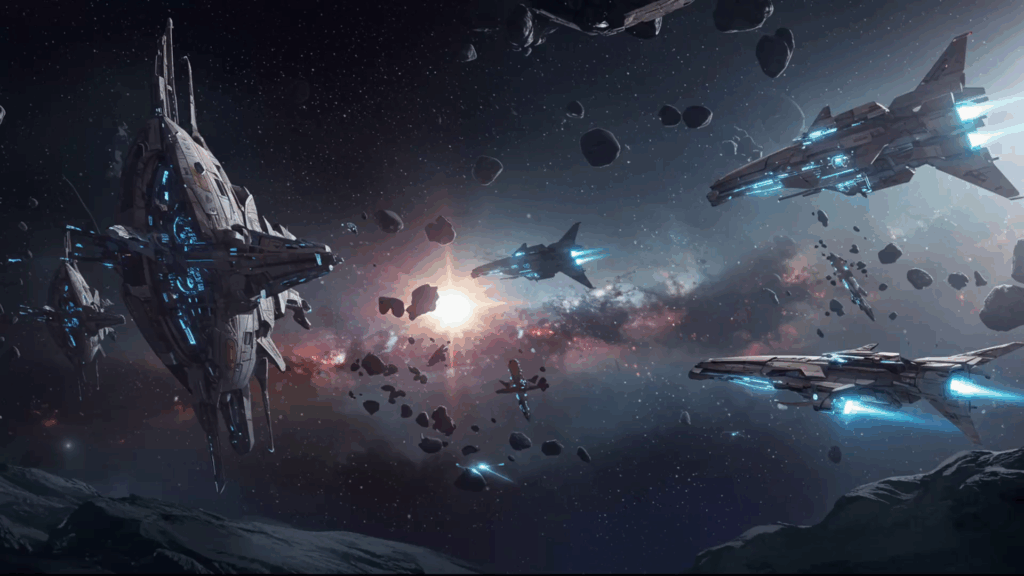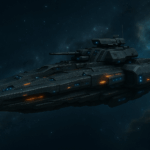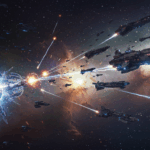Dr. Elena Vasquez pressed her palm against the crystalline surface, feeling the ancient hum that had drawn her across three star systems. The artifact pulsed with a rhythm that seemed almost… alive. Around her, the excavation site buzzed with activity—humans working with the desperate efficiency of a species fighting for relevance in a galaxy that had long since written them off.
“Another dead end,” muttered Commander Hayes, the expedition’s military liaison. His weathered face bore the permanent scowl of someone who’d spent too many years watching humanity scrape for scraps at the galactic table. “The Consortium’s already marked this system for strip mining. We’ve got maybe six months before they turn this whole planet into raw materials.”
Elena’s fingers traced the intricate patterns etched into the crystal. Something about them felt familiar, though she couldn’t place why. The archaeological team had been working this dig for three months, uncovering what appeared to be the remnants of a civilization that predated even the ancient Progenitors—the mysterious race whose technology had formed the backbone of galactic civilization for millennia.
The Galactic Consortium treated humanity like cosmic janitors. Sure, they’d been granted membership after first contact two centuries ago, but it was the kind of membership reserved for species useful primarily for manual labor and resource extraction. Humans were good at digging, good at dying in dangerous places, good at doing the jobs that more “advanced” species found beneath them.
The Zelari, with their crystalline exoskeletons and hive-mind efficiency, controlled most of galactic commerce. The Threnodi, those graceful energy beings who existed partially outside normal space-time, dominated scientific research and theoretical physics. The Korvan Empire, militant and hierarchical, maintained order through superior military technology inherited from Progenitor ruins.
And humans? Humans got the mining contracts and the cleanup jobs.
“Dr. Vasquez!” The voice belonged to Marcus Chen, her graduate assistant. The young man was practically vibrating with excitement as he emerged from the deeper excavation tunnels. “You need to see this. Now.”
Elena followed Marcus through the winding passages they’d carved into the ancient structure. The walls here were different—not the usual stone and metal composite they’d been finding, but something that seemed to shift and flow like liquid mercury frozen mid-motion. Bioluminescent veins pulsed through the material, casting everything in an ethereal blue-green glow.
“Here,” Marcus said, stopping before what appeared to be a solid wall. “Watch this.”
He placed his hand against the surface, and Elena gasped as the wall simply… dissolved. Not melted or retracted, but faded away like morning mist, revealing a chamber beyond that defied every law of physics she knew.
The space was impossibly vast—far larger than the structure they’d been excavating could possibly contain. Floating platforms of the same liquid-metal material drifted through the air, connected by bridges of pure light. And everywhere, covering every surface, were symbols that made Elena’s head spin just looking at them.
“The readings are off the charts,” Marcus whispered. “Whatever this place is, it’s still active. Still… thinking.”
Elena stepped into the chamber, and immediately felt a presence brush against her mind. Not invasive, not threatening—more like a gentle inquiry, as if something ancient and vast was asking: Who are you?
She thought back, instinctively: I’m human. We’re… we’re looking for answers.
The response came not in words but in images, flooding her consciousness with visions of a galaxy teeming with life, of civilizations rising and falling across eons, of a great work left unfinished when its creators transcended physical existence. And threaded through it all, a single, impossible truth: this technology, this vast repository of knowledge, had been waiting. Waiting for a species young enough to see possibilities where others saw only limitations.
Waiting for humanity.
The Awakening
Three months later, Dr. Kai Nakamura stared at the data streams flowing across his holographic displays and wondered if he was losing his mind. The artifact Elena’s team had discovered—what they’d started calling the Archive—was rewriting everything humanity thought they knew about technology, physics, and their place in the universe.
“Run the simulation again,” he told his AI assistant, ARIA. The artificial intelligence had been his constant companion for the past decade, helping him push the boundaries of human technology in ways that consistently impressed exactly no one in the galactic community.
“Kai, I’ve run it forty-seven times. The results don’t change.” ARIA’s voice carried a note of what might have been exasperation, if AIs could feel such things. “The energy output is theoretically impossible according to known physics. The matter conversion efficiency exceeds one hundred percent. The quantum entanglement arrays operate across galactic distances instantaneously.”
Kai rubbed his temples. The Archive hadn’t just given them new technology—it had given them a completely new understanding of how reality worked. The Progenitor tech that formed the backbone of galactic civilization was like a child’s toy compared to what they’d found. But more importantly, the Archive seemed designed specifically for human neural patterns, human ways of thinking.
“Show me the consciousness interface data again.”
The hologram shifted, displaying the brain scans taken during Elena’s initial contact with the Archive. The patterns were unlike anything in the medical literature—synaptic activity that suggested her consciousness had briefly expanded beyond the confines of her physical brain, interfacing directly with quantum processing matrices that existed partially outside normal space-time.
“The Zelari couldn’t do this,” Kai murmured. “Their hive-mind structure is too rigid. The Threnodi are too energy-based—they can’t interface with quantum-matter hybrid systems. The Korvans…” He laughed bitterly. “The Korvans would probably try to weaponize it and blow themselves up.”
“But humans can,” ARIA finished. “Our chaotic, individualistic, pattern-seeking brains are apparently exactly what this technology was designed for.”
Kai stood and walked to the window of his laboratory, looking out at the bustling human colony on Kepler-442b. It was a typical human settlement—cramped, efficient, built with salvaged materials and stubborn determination. Nothing like the gleaming spires of Zelari commercial hubs or the impossible geometries of Threnodi research stations.
But now… now they had something the galaxy had never seen.
“ARIA, begin Project Renaissance. Full implementation of Archive-derived technologies. I want prototype vessels, defensive systems, and industrial applications ready for testing within six months.”
“Kai, the political implications—”
“Are exactly why we need to move fast.” He turned back to his displays, mind already racing through the possibilities. “The moment the Consortium realizes what we’ve found, they’ll try to take it. We need to be ready.”
The first test came sooner than expected.
The Demonstration
Ambassador Sarah Chen had spent fifteen years learning to smile while being insulted. It was, she’d discovered, an essential skill for human diplomats in galactic society. The current insult was being delivered by High Coordinator Zeth’kar of the Korvan Empire, whose four arms gestured dismissively as he spoke.
“The humans request increased mining quotas in the Vega system,” he rumbled, his translator rendering his words in flat, mechanical tones. “This is… amusing. Perhaps they believe their recent archaeological findings grant them some new status?”
The Consortium Council chamber was a monument to alien superiority—soaring architecture that dwarfed human visitors, atmospheric conditions that required humans to wear breathing apparatus, seating arrangements that literally placed human representatives below the other species. Sarah had learned to use these slights as motivation.
“High Coordinator,” she replied, her voice steady despite the breathing mask, “humanity’s contributions to galactic society have always been undervalued. We believe it’s time for a more… equitable arrangement.”
Zelari Hive-Speaker Crysth’ine’s crystalline form chimed with what Sarah had learned to recognize as laughter. “Equitable? Humans contribute labor and raw materials. The Consortium provides technology, protection, and civilization. This seems quite equitable.”
“Perhaps,” Sarah said, reaching into her diplomatic pouch, “it’s time to reconsider what humanity brings to the table.”
She placed a small device on the council table—no larger than her palm, made of the same liquid-metal material as the Archive. It looked innocuous enough, but Sarah could see the way the alien representatives leaned forward, their various sensory organs focusing on the object.
“This is a basic fabrication unit,” she explained. “It can convert any matter into any other matter at the molecular level. The energy requirements are minimal. The process is instantaneous.”
High Coordinator Zeth’kar’s laugh was like grinding stone. “Impossible. Such technology would violate fundamental conservation laws.”
Sarah smiled and activated the device.
The transformation was subtle at first—the metal surface of the council table began to shift and flow, restructuring itself at the atomic level. Within moments, what had been a simple alloy table was now a complex crystalline sculpture that pulsed with internal light, its structure incorporating elements that hadn’t existed in the original material.
The silence in the chamber was deafening.
“The Archive,” Sarah continued, as if she hadn’t just demonstrated technology that made Progenitor artifacts look primitive, “contains the accumulated knowledge of a civilization that transcended physical existence approximately fifty million years ago. They left it as a gift for whoever was ready to receive it.”
She paused, letting that sink in.
“It turns out, they were waiting for us.”
Threnodi Research Prime Vel’tar’s energy form flickered with what Sarah recognized as distress. “This… this changes everything. The implications for galactic power structures, for trade, for—”
“For humanity’s place in the galaxy,” Sarah finished. “Yes, it does.”
High Coordinator Zeth’kar’s four arms were now clenched into fists. “You cannot simply appear with impossible technology and expect—”
“Expect what?” Sarah’s voice carried a new edge, one that made the alien representatives shift uncomfortably. “Expect to be treated as equals? Expect fair representation in galactic affairs? Expect to not be relegated to manual labor and resource extraction?”
She stood, and for the first time in her diplomatic career, she was looking down at the alien representatives rather than up.
“The Archive contains technologies that make faster-than-light travel look like a parlor trick. Matter conversion that could end scarcity throughout the galaxy. Consciousness-interface systems that could revolutionize how we understand intelligence itself. And it only responds to human neural patterns.”
The implications hung in the air like a sword.
“So yes, High Coordinator, I expect things to change. The question is whether that change happens through cooperation or through… other means.”
The Reckoning
The Korvan battle fleet dropped out of hyperspace with the subtle grace of falling mountains. Fifty dreadnoughts, each one a kilometer-long monument to military engineering, their hulls bristling with weapons that could crack planets. Admiral Thek’mor had been given simple orders: secure the human colony on Kepler-442b and claim the Archive for the Empire.
It should have been a simple operation. Humans had no significant military presence in the system—a few patrol ships, some orbital defense platforms that were barely more than armed satellites. The colony itself was protected by shields that were adequate against pirates but laughable against Imperial firepower.
“Begin the bombardment,” Admiral Thek’mor commanded. “Target their defensive installations first. We want the Archive intact.”
The first salvo of plasma cannons lit up the void between the fleet and the colony. Enough firepower to level a city, focused on the orbital platforms that represented humanity’s pathetic attempt at defense.
The energy beams struck… and simply vanished.
“Report!” Thek’mor barked, his four arms working frantically at his command console.
“Sir, the defensive platforms appear to be equipped with some form of energy absorption technology. Our weapons fire is being… redirected somehow.”
On the main display, the human orbital platforms were beginning to glow with absorbed energy. And then, impossibly, they began to fire back.
But these weren’t the crude kinetic weapons or basic energy beams that human technology was known for. These were streams of pure force that seemed to bend space-time around them, weapons that struck with the power of collapsing stars.
The lead dreadnought, the Korvan’s Might, simply ceased to exist. Not destroyed, not vaporized—it was there one moment and gone the next, as if it had been edited out of reality.
“All ships, evasive maneuvers!” Thek’mor shouted, but it was too late.
The human defense platforms were moving now, not through space but through dimensions that shouldn’t exist, appearing and disappearing around the Korvan fleet like deadly ghosts. Each appearance brought another impossible weapon to bear, each shot removed another piece of the Empire’s finest fleet from existence.
“Sir, we’re receiving a transmission from the colony.”
The main screen flickered, and Admiral Thek’mor found himself looking at a human female—young, with the kind of confident smile that he’d learned to associate with dangerous predators.
“Admiral,” the human said, “this is Commander Elena Vasquez of the Terran Defense Corps. I believe you’re looking for something that belongs to us.”
“You will surrender the Archive immediately,” Thek’mor growled, “or face the full might of the Korvan Empire.”
Elena’s smile widened. “Admiral, you’re currently facing the full might of the Korvan Empire. How’s that working out for you?”
On the tactical display, another dreadnought winked out of existence.
“The Archive chose us,” Elena continued. “Not because we’re the strongest or the smartest or the most advanced. Because we’re the most adaptable. Because we see possibilities where others see only limitations. Because we’re willing to change.”
She leaned forward, and her expression grew serious.
“You have a choice, Admiral. You can continue this attack and lose your entire fleet, or you can withdraw and tell the Empire that humanity is no longer interested in being anyone’s junior partner.”
Thek’mor looked at his tactical display. In the space of ten minutes, he’d lost half his fleet to weapons that shouldn’t exist, deployed by a species he’d dismissed as barely above animals.
“This isn’t over,” he snarled.
“No,” Elena agreed. “It’s just beginning.”
The New Paradigm
Six months later, Ambassador Sarah Chen walked into the Consortium Council chamber and didn’t bother to hide her smile. The seating arrangements had been… adjusted. The atmospheric conditions were now suitable for multiple species. And for the first time in human history, the human representative’s chair was at the same level as everyone else’s.
“The Terran Federation,” she announced, “is pleased to present our proposal for galactic restructuring.”
The holographic display that materialized above the council table showed star charts, trade routes, and technological specifications that made the alien representatives lean forward with interest rather than condescension.
“We propose the establishment of joint research initiatives, shared technological development, and equitable resource distribution throughout Consortium space. The Archive technologies will be made available to all member species, with appropriate safeguards and oversight.”
High Coordinator Zeth’kar’s voice carried none of its former arrogance. “And if we refuse?”
Sarah’s smile didn’t waver. “Then you’ll fall behind. The galaxy is changing, High Coordinator. The question is whether you want to change with it or be left behind by it.”
She gestured, and the display shifted to show images of human colonies throughout the galaxy—no longer cramped mining outposts but gleaming cities that rivaled anything the other species had built. Ships that moved through space like living things, their hulls flowing and adapting to conditions. Industrial complexes that could reshape matter at the molecular level.
“Humanity spent two centuries proving we could survive in your galaxy,” Sarah said. “Now we’re going to show you what we can build in ours.”
Zelari Hive-Speaker Crysth’ine’s crystalline form chimed with what Sarah now recognized as respect. “The Zelari Collective accepts the Terran proposal. We… look forward to learning from your innovations.”
One by one, the other representatives voiced their agreement. Even High Coordinator Zeth’kar, though his acceptance came through gritted teeth.
As the session concluded and the alien representatives filed out, Sarah remained in her chair, looking up at the soaring architecture that had once been designed to make humans feel small. Now it just looked… quaint.
Dr. Elena Vasquez’s voice came through her communicator. “How did it go?”
“Better than expected,” Sarah replied. “Though I think we’re going to need bigger chairs.”
Elena’s laugh carried across the comm channel. “The Archive is already working on that. Apparently, it has some ideas about optimal council chamber design.”
Sarah stood and walked to the chamber’s great windows, looking out at the bustling spaceport beyond. Ships from dozens of species moved through the traffic patterns, but now they shared the sky with vessels of human design—sleek, adaptive craft that seemed to dance through space rather than merely traverse it.
“Elena,” she said, “what do you think the Builders—the ones who left the Archive—what do you think they would say about what we’ve become?”
There was a long pause before Elena answered. “I think they’d say we’re exactly what they hoped we’d become. Not perfect, not all-powerful, but… ready. Ready to take the next step.”
Sarah nodded, watching a human exploration vessel disappear into hyperspace, bound for the galactic rim and whatever wonders waited there.
Humanity had spent millennia looking up at the stars and wondering if they were alone. Then they’d spent centuries learning they weren’t alone but weren’t particularly special either.
Now, finally, they were learning what they’d always suspected: that being human meant something after all.
The galaxy was vast, ancient, and full of wonders. But for the first time in their history, humans weren’t just visitors in that galaxy.
They were home.


